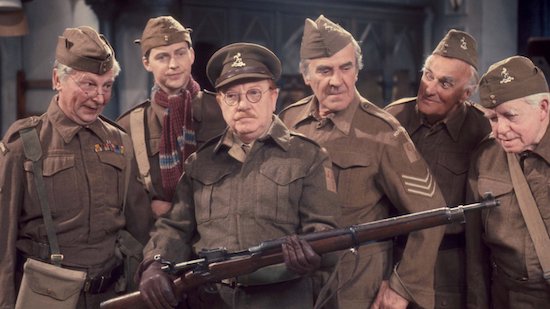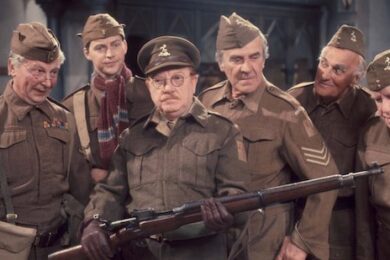Devotees of the popular American sitcom Friends are known, I believe, to converse about which member of the cast they most resemble – “OMG, I am sooo Phoebe!”, “you’re such a Chandler”, and so on. I have spent the last three and a bit decades doing something similar, but with the characters of Dad’s Army, the British sitcom first broadcast in 1968, which ran for 80 episodes until 1977, and was recently subjected to an ill-advised cinematic remake. It was a staple of my television viewing as a child, and I eagerly anticipated sitting down on a Saturday teatime for that animated opening sequence (see above) in which Nazi swastika arrows loop through continental Europe, pushing back the Union Flag arrow until it retreats across the English Channel, and sits there, jabbing towards conquered France like an impotently yapping dog. I often see Dad’s Army dismissed as Keep Calm & Carry on war-nostalgia TV, hardly surprising when it was sucked into the right wing media’s rhetoric around Brexit, but it never has been for me. Instead it was, and is, a work of art simmering with a sense of dread – those swastika arrows moving across the map in the opening credits give me the creeps.
That animation is accompanied by one of the greatest telly themes of all time, which, though it sounds like it could be one, isn’t a wartime era song at all, but was composed for the programme by Jimmy Perry and Derek Taverner, and sung by music hall entertainer Bud Flanagan. “Who do you think you are kidding, Mr Hitler?” it asks the perfidious Führer over the sea, promising that should the dreaded German parachutists descend from their Ju 52s,
“Mr Brown goes off to town on the 8:21
But he comes home each evening and he’s ready with his gun.”
Against the upstart Mr Hitler and his airborne troops, possibly or probably dressed as nuns, is the array of yeoman Englishmen in the Walmington-on-Sea Home Guard platoon: the butcher (Corporal Jones), the bank staff (Captain Mainwaring, Sergeant Wilson, Private Pike), the undertaker (Private Frazer) and the old man (Private Godfrey). Although I spent my childhood eagerly hunting through the Radio Times for Sunday afternoon war f…



